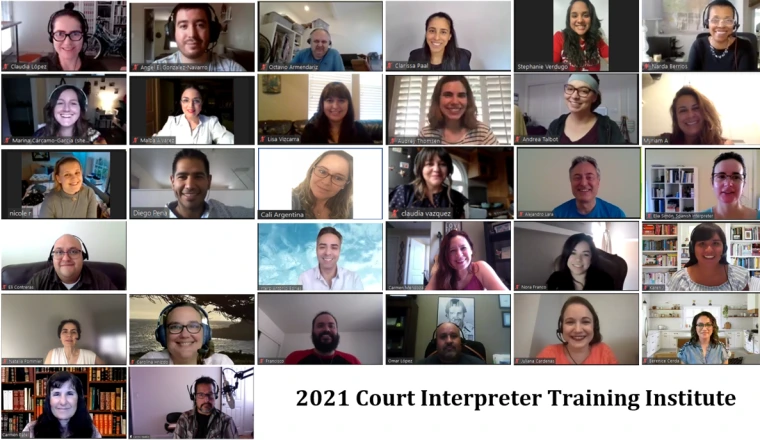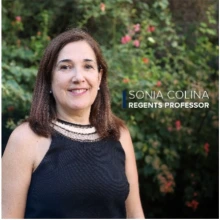Dear Colleagues and Friends,
Now that 2021 is behind us all, we at NCI wanted to take a moment and reflect on the past year and share some of what we’ve done with you. We hope that it will serve as a springboard to an exceptional 2022!
2021 was a challenging year for everyone as we all learned to navigate through new remote environments and work in a host of areas and industries, each of which responded to the pandemic differently. As language service providers, we all had to follow suit. Nonetheless, NCI continued to try to provide the highest level of service that we could in support of our mission to advance language access and to contribute to the field as a whole.
Thanks to everyone who contributed to NCI’s work in 2021. Thanks to all our exceptional instructors and students! Thanks also to the University of Arizona College of Humanities for its stalwart support!
Below you’ll find information on our 2021 in three areas:
- NCI’s 2021 training efforts (including our webinars and Court Interpreter Training Institute)
- An update on NCI’s work at the University of Arizona
- The burgeoning field of school interpreting
If you have any questions, reflections, or ideas for future initiatives, please let us know: ncitrp@arizona.edu. Please also share your professional successes with us. We love to hear about it when your hard work pays off with promotions, state or federal certification, or other accolades!
We wish you the very best 2022, personally and professionally!
As usual, in 2021 NCI’s primary focus was providing training for interpreters and translators. Our trainings included a host of standalone webinars offered throughout the year, as well as our comprehensive Court Interpreter Training Institute (CITI), which ran June 1-July 16 in 2021. We also held our Online Translation Certificate courses for Spanish/English translators. This program, developed by our Director, Dr. Sonia Colina, continues to grow, which is extremely rewarding. In fact, in 2021, our Online Translation Certification won an award! We’re working on developing a certificate for interpreting as well!
In 2021, NCI held 36 webinars which together provided professional development for just over 1000 practicing and aspiring interpreters and translators. Of these 36 webinars, 20 focused on Spanish/English interpreters and 16 were open to interpreters of all languages. Our open webinars included a series of three 3-hour webinars that focus on fundamental aspects of interpreting (such as ethics and technique in different modes) that were offered for only $25 each. They were very well attended and we hope are valuable for interpreters of all language seeking to improve their proficiency. We’ll be holding this series again in January 2022 as well as the fall.
Six of our webinars in 2021 were brand new, covering topics we had not addressed directly before. These were:
- Interpreting for Plea Agreements and Sentencing
- Interpreting for Administrative Hearings
- Basics of Terminology Management
- Practical Literary Translation (w/ALTA)
- Collaborating with Speech Language Pathologists
- Collaborating with Audiologists
Our two “collaborating” webinars were new additions to our school interpreting repertoire taught by our own Dr. Holly Silvestri. The field of school interpreting for spoken languages is only now being recognized and NCI has been working to provide the highest caliber training for interpreters working in schools. See below for more on school interpreting!
Practical Literary Translation was held in partnership with our colleagues at the American Literary Translators Association (ALTA). It was great working with them.
The American Literary Translators Association (ALTA) is a nonprofit arts membership association that provides resources, community, and professional affiliation to its members: individual translators, academic institutions, presses, and others working in literary translation. The annual ALTA conference, held in a different location each year, is the largest gathering of literary translators in the US, and the only one of its kind. ALTA further supports the literary translation community through its book awards, Travel Fellowships for early-career translators, and the Emerging Translator Mentorship Program. Questions? Email us at info@literarytranslators.org, and follow us @LitTranslate.
The 2021 Court interpreter Training Institute (CITI) was our second CITI held entirely online, and our 38th CITI overall.
We learned a lot about online interpreting instruction during our inaugural online CITI in 2020, and we applied those lessons to great effect in 2021. All told, 28 working or aspiring court interpreters from 13 states (and Mexico) attended.

As you may know, the CITI is one of the premier training opportunities for Spanish/English interpreters in the country. Held every summer, it offers 120 hours of intensive training focused on improving interpreting proficiency. One way we measure its impact is through pre- and post-testing using our interpreting performance tests. In 2021, our 28 graduates increased their scores an average of +17 percentage points. That is a very gratifying number! It speaks to the CITI’s ability to make interpreters better.
Student Experience
The students’ experience of the CITI is also important to us. In 2021, as every year, we get a wide range of students, from relatively new, aspiring court interpreters to seasoned veterans preparing for state or federal certification. Here are some impressions from two of our 2021 students. First is Marina Cárcamo García, who is a PhD candidate in Hispanic Linguistics at the University of Arizona. Marina was awarded a scholarship by the Department of Spanish and Portuguese to attend. Here are her impressions. (Sidenote: Marina will be teaching SPAN 341: Translation and Interpretation - Social Justice and Practice as part of the University’s undergraduate major in translation and interpretation in the Department of Spanish and Portuguese. We hope her CITI experience proves valuable in this new endeavor!)
I applied for the CITI scholarship because I thought that it would be very helpful both for my prospective academic career as a professor in Translation and Interpretation and my possible future career as a Court Interpreter.
Professors in Translation and Interpretation should have knowledge of both translation and interpretation (T&I) studies and practice. T&I studies can be learned in academia by applying research methods to topics of interest, such as the use of T&I in the world languages classroom. T&I practice is more difficult to learn if you do not have experience in it. Personally, I graduated with a BA in T&I and I was able to professionally work as a translator, but I did not have professional experience in interpretation. I wanted to take the CITI to develop my knowledge in interpretation practice in the U.S. and improve my interpretation skills in Court Interpretation, which is a growing career in this country.
I consider that the CITI is a great opportunity both for prospective professional interpreters and academics in translation and interpretation. The course is very complete and well-designed.
The first part of the training is based on live webinars and activities on discourse analysis, ethics, law concepts and specific terminology that future court interpreters will need in their practices. As a future professor of translation and interpretation, I learned not only the contents, but how the contents were presented to us.
Even though most CITI students are not familiarized with some of the topics, such as weaponry or medical terms, instructors make a great effort in explaining them in an interesting, fun and comprehensive way.
The second part of the training is based on sight translation, consecutive interpretation and simultaneous interpretation practice. While the first part of the training can be done in your free time, the second part of the training is intensive and it should be your priority during those two weeks. The second part was very specific, we would practice with real cases and interpret them. It was also full of feedback from the instructors and the colleagues, and even from yourself, since you learn to self-assess you. This part not only helps future interpreters but future professors as well, since you learn how to teach professional business and law interpretation.
Overall, I really enjoyed taking this training and I learned a lot. I will use all the knowledge I acquired for a future research project and my teaching at the university. Probably one day, I may also take the state or national court interpretation exam, because I feel that the CITI really gives you the tools to prepare for the exam one day.
Marina Cárcamo García
Our second student is Narda Berrios. Narda is an experienced interpreter now serving as the Senior Manager for the Office of Language Access (OLA) for Massachusetts. Here is her reflection on the 2021 CITI.
This past summer, I completed the Court Interpreter Training Institute with The University of Arizona. As a former Spanish interpreter for over twenty plus years, I never took any program or training that came close to the CITI program. I am currently the Senior Manager and the Language Access Coordinator for the Massachusetts Trial Court Office of Language Access (OLA), in Boston Massachusetts and I must say that this was the most challenging and rewarding interpreter training that I have ever been a part of. I wanted to be part of this program for years, due to the traveling time required and other responsibilities I was not able to and when it became available online, I applied. I received the acceptance letter; I was both nervous and excited because I knew of the CITI program reputation.
This program met all my expectations and then some, the instructors, the labs, the workshops, and the interactions with all the students from different part of the United States and those attending from other countries were amazing. This program challenged all of us to be better, the instructors taught us how to practice and what to focus on to use our time wisely and get results.
I have been taking classes and attending conferences for over twenty years, and I have never taken a course like this one. The instructors are experts in the field and top of the line interpreter, the CITI staff is attentive and provided clear information and answered any questions timely. The materials used were relevant and challenging for interpreting regardless of the level and years of experience we had. As a Senior Manager now and a former interpreter, I would recommend this program to anyone who wants to get better and go to a different level in this profession. You will learn new techniques for better interpreting, increase your vocabulary and make connections with other interpreters from many diverse backgrounds. If you are looking to become certified at the national or federal level this is also the program for you, I wish I had done it while I was still interpreting as a staff interpreter. This is worth every penny invested and it will change the way any interpreter performs.
Narda Berrios
Lastly, we’d like to thank all the instructors who made the 2021 CITI possible. Thanks to Joshua Elliott, Ernest Niño-Murcia, and Gloria Rivera! Special thanks to Carmen Patel and Carlos Radillo for their excellent work running the intensive interpreting labs in July (as well as so much more)! If you’re interested in the 2022 Court Interpreter Training Institute, which will be online once again, let us know: ncitrp@arizona.edu.
First, we’d like to congratulate our Director, Dr. Sonia Colina, for earning the rank of Regent’s Professor in 2021. It’s a remarkable and well-deserved achievement, especially given the breadth of her work related to both scholarship and social justice. Not one to rest on her laurels, Dr. Colina has sought to integrate NCI more fully into the compelling work being done at the University of Arizona. She has worked to improve diversity and inclusion of language minorities in research, to help ensure that it is more representative and comprehensive. In this same vein, Dr. Colina presented on community-based participatory translation as a tool to improve research at the National Stakeholder Workshop on Hearing Healthcare for Hispanic/LatinX Adults hosted by the Hispanic Hearing Healthcare Access Coalition (H3 Coalition) and the American Auditory Society. You can watch her 20-minute presentation here.

Another area of note in Dr. Colina’s repertoire in 2021 was her work on effectively integrating translation into language classrooms to enhance language learning. She and her colleague, Sarah Albrecht, presented on this topic at an event hosted by the Center for Educational Resources in Culture, Language and Literacy (CERCLL). You can learn more about it and watch their 80-minute presentation here. They also developed a freely available guidebook on the topic, Incorporating Translation in the World Language Classroom: A Teacher’s Guide to Best Practice.
The field of school interpreting is growing in recognition. It is an important area given all that hinges on high quality interpreting to provide equal access to education services for limited English proficient students and their parents or guardians. NCI’s Dr. Holly Silvestri, herself an interpreter/translator and a certified teacher, has been involved in the field for some time. She works tirelessly teaching webinars on school-related topics such as interpreting for special education and presenting on an array of topics. In 2021, she presented at 15 events on topics ranging from ethics for school interpreters to IEP meetings to collaborating with speech language pathologists. One of those presentation took place at the New England Translators Association’s conference. You can read a review of Dr. Silvestri’s talk on page 13 of the NETA Newsletter.

Dr. Silvestri provided this brief look at the ongoing professionalization of the field:
For many years those of us working in spoken interpreting in educational settings have not had any real recognition or a place to call home, but the tipping point came in 2018, when a few of us finally got our act together and said we need to change this. The Interpreters and Translators (ITE) Workgroup officially formed in September 2019 to launch a national conversation about the need to professionalize interpreting and translation in educational settings. Our first national call was at the third annual Orange County (CA) Department of Education Interpreters and Translators Conference, where the organizers graciously let us have an open session to discuss this with anyone who joined us either in person at the conference or via zoom. It was clear right from the start of this meeting that we were onto something.
Over the next 18 months, the founding members of the ITE Workgroup worked tirelessly to build the foundation for a bona fide professional association for interpreters and translators in education. Along the way, it created committees that started the work of researching and creating a code of ethics, best practices, a job task analysis, among others. On April 30th, 2021, the Leadership Committee, composed of the co-chairs for each ITE Workgroup Standing Committees held its last meeting and the inaugural interim Board of Directors was voted in. The American Association of Interpreters and Translators in Education (AAITE) was born. As a founding member of this organization, I am proud to have helped create a home for this growing specialization. I invite you to explore the AAITE website.. I think you will find it very interesting, and a wonderful resource for those of us who call this specialization our own.

